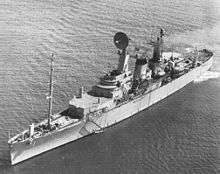USS Northampton (CLC-1)
_underway_c1959.jpg) USS Northampton (CLC-1) | |
| History | |
|---|---|
| Name: | Northampton |
| Namesake: | Northampton, Massachusetts |
| Builder: | Bethlehem Steel Corporation, Quincy, Massachusetts |
| Laid down: | 31 August 1944 |
| Launched: | 27 January 1951 |
| Sponsored by: | Mrs. Edmond J. Lampron |
| Commissioned: | 7 March 1953 |
| Decommissioned: | 8 April 1970 |
| Reclassified: | CC-1 15 April 1961 |
| Struck: | 1 December 1977 |
| Identification: | Hull symbol:CA-125/CLC-1/CC-1 |
| Fate: | Sold for scrap in December 1977. Scrapping completed 01 March 1980 |
| General characteristics | |
| Class and type: | Oregon City-class cruiser |
| Displacement: | 13,700 long tons (13,920 t) |
| Length: | 674 ft 11 in (205.71 m) |
| Propulsion: | Steam turbines, 120,000 shp (89 MW), 4 boilers, 4 shafts |
| Speed: | 33 knots (61 km/h; 38 mph) |
| Complement: | 2,000 |
| Armament: |
|
| Armor: | |
| Aviation facilities: | landing pad available for one helicopter |
The third USS Northampton (CLC-1) was a US Navy command light cruiser (command ship). She was laid down as an Oregon City-class heavy cruiser (CA–125), on 31 August 1944 by the Fore River Yard, Bethlehem Steel Corp., Quincy, Massachusetts. Work suspended between 11 August 1945 and 1 July 1948; she was launched as CLC–1, on 27 January 1951; sponsored by Mrs. Edmond J. Lampron; and commissioned as CLC–1, on 7 March 1953, Captain William D. Irvin in command.
History
Following shakedown, Northampton reported for duty to Commander Operational Development Forces, Atlantic Fleet. For seven months she conducted extensive tests of her new equipment. Evaluation completed in September 1954 and she reverted to the operational control of Commander Battleship Cruiser Force, Atlantic Fleet. She next demonstrated her capabilities as a tactical Command Ship by serving as flagship, first for Commander Amphibious Force, Atlantic Fleet (October–November 1954) and then for Commander 6th Fleet (December 1954–March 1955). Between 1 September and 22 October she served as flagship for Commander Strike Force, Atlantic, a position she was to hold frequently over the next fifteen years.
On 24 February 1956, Northampton emerged from her first overhaul at the Norfolk Naval Shipyard, Portsmouth, Virginia, and, after refresher training off Cuba, participated as a unit of the Navy’s first guided missile division afloat, CruDiv 6, in the first public demonstration of the Terrier missile. In April, she steamed east for six months with the 6th Fleet, and, during the summer of 1957, resumed midshipmen training cruises. However, between that time and 1961, she infrequently returned to European waters. Deployed on occasion for NATO and fleet exercises and People to People visits, the command ship was visited by high government officials of various European countries, including Kings Baudouin I of the Belgians and Olav V of Norway.
Decommissioning

Redesignated CC–1 on 15 April 1961, Northampton remained in the western Atlantic until decommissioning in February 1970. Her cruises ranged from Canadian to Panamanian waters as she extensively tested and evaluated new communications equipment and played host to visiting national and international dignitaries, including Presidents John F. Kennedy and Lyndon B. Johnson. The ship was eventually withdrawn from service, and was stricken from the Naval Vessel Register on 31 December 1977.
"Floating White House"
According to a Washington Post article on 29 July 2006, Northampton was part of the U.S. government's plan for Continuity of Operations and reported to be a "floating White House" to which the President could be evacuated in the event of nuclear attack. As such she was designated as the National Emergency Command Post Afloat (NECPA). Wright was her sister ship and also designated part of NECPA. The ship was modified with an extra deck, the tallest communications mast in the Navy and multi-link communications gear.
Awards
- National Defense Service Medal (2 awards)
See also
References
- "A White House Physician" by James Young, M.D., in Our White House: Looking In, Looking Out (Candlewick Press 2008)
- http://www.globalsecurity.org/military/systems/ship/clc-1.htm
External links
| Wikimedia Commons has media related to USS Northampton (CLC-1). |
- Photo gallery of USS Northampton at NavSource Naval History
This article includes information collected from the public domain sources Dictionary of American Naval Fighting Ships and Naval Vessel Register.